Piano Sheet Music
 "...Scotty Moore plays one of the first really amazing riffs in rock history on Heartbreak Hotel with Elvis Presley ... it was dangerous, it scared everybodys parents, which was part of the attraction then - as it still is now... it totally blindsided me and made me want to get a guitar and do that ..." Roger McGuinn / Byrds
"...Scotty Moore plays one of the first really amazing riffs in rock history on Heartbreak Hotel with Elvis Presley ... it was dangerous, it scared everybodys parents, which was part of the attraction then - as it still is now... it totally blindsided me and made me want to get a guitar and do that ..." Roger McGuinn / Byrds
Leslie Wagle

she is a female musician doing new age arrangements and cover music.
Jo Blankenburg

Jo Blankenburg is a German composer based in Los Angeles. He writes music for film and motion picture advertising. Some of his most popular tracks have been used in the advertising campaigns of The Hunger Games, Harry Potter and the Deathly Hallows, X-Men: First Class, and How To Train Your Dragon among many others.
Corrina Hewat
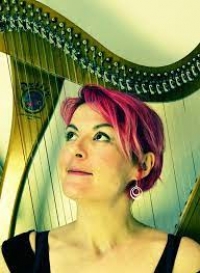
Corrina Hewat is a Scottish harpist and composer who was awarded Music Tutor of the Year at Na Trads in 2013. She has worked with poet Robin Robertson and has written music for the Dunedin Consort.
Traditional

Debussy

Achille-Claude Debussy (August 22, 1862 – March 25, 1918) was a French composer. Along with Maurice Ravel, he is considered one of the most prominent figures working within the field of Impressionist music, though he himself intensely disliked the term when applied to his compositions. Debussy was not only among the most important of all French composers but also was a central figure in all European music at the turn of the twentieth century.
Debussy's music virtually defines the transition from late-Romantic music to twentieth century modernist music. In French literary circles, the style of this period was known as Symbolism, a movement that directly inspired Debussy both as a composer and as an active cultural participant.
Debussy's music virtually defines the transition from late-Romantic music to twentieth century modernist music. In French literary circles, the style of this period was known as Symbolism, a movement that directly inspired Debussy both as a composer and as an active cultural participant.
Yann Tiersen

Guillaume Yann Tiersen (born 23 June 1970) is a French musician and composer known internationally for composing the score to the Jean-Pierre Jeunet movie Amélie. His music is recognized by its use of a large variety of instruments in relatively minimalist compositions, often with a touch of either European classical music or French folk music, using primarily the piano, accordion or violin together with instruments like the melodica, xylophone, toy piano, ondes martenot, harpsichord and typewriter. His musical style is reminiscent of Frédéric Chopin, Erik Satie, Philip Glass and Michael Nyman.
Krezip

Krezip is a Dutch band from Tilburg. Active members are singer and pianist Jacqueline Govaert, her sister Anne Govaert on guitar, Annelies Kuijsters playing keyboards, and Joost van Haaren on the bass guitar. In 2004 guitar player Thomas Holthuis was replaced by JanPeter Hoekstra and drummer Thijs Romeijn by Bram van den Berg.
Krezip started as a four-member school band during 1997, in Tilburg, The Netherlands. A year later a new drummer was added. During 1998 Krezip was an act at many festivals throughout the country, such as Festival Mundial, Noorderslag, and Lowlands. Studies and age became a sticking point to accept big offers in the music world. The first official sign of their existence came in 1999, when the band released a demo album on their own label called "Run Around". Big success however didn't materialize until 2000.
The meaning of the name 'Krezip' is rather unclear. Most likely, this name has been chosen as an anagram for 'perzik', the Dutch word for peach, since the band members have continually been eating peaches during their rehearsals.
Jacqueline Govaert has written all of Krezip's songs. She started writing music when she was 12 years old. She states that she can write the best when she doesn't understand anything of the world.
Krezip started as a four-member school band during 1997, in Tilburg, The Netherlands. A year later a new drummer was added. During 1998 Krezip was an act at many festivals throughout the country, such as Festival Mundial, Noorderslag, and Lowlands. Studies and age became a sticking point to accept big offers in the music world. The first official sign of their existence came in 1999, when the band released a demo album on their own label called "Run Around". Big success however didn't materialize until 2000.
The meaning of the name 'Krezip' is rather unclear. Most likely, this name has been chosen as an anagram for 'perzik', the Dutch word for peach, since the band members have continually been eating peaches during their rehearsals.
Jacqueline Govaert has written all of Krezip's songs. She started writing music when she was 12 years old. She states that she can write the best when she doesn't understand anything of the world.
Muse

Muse are a British rock band formed in Teignmouth, Devon, United Kingdom in 1994 under the alias of Rocket Baby Dolls. The band comprises Matthew Bellamy (vocals, guitar and piano), Christopher Wolstenholme (bass guitar and backing vocals) and Dominic Howard (drums and percussion). Muse's style can be considered as a mixture of many musical genres, most notably alternative rock, classical music and electronica. Muse are known best for their energetic and visually dazzling live performances and on June 16th & 17th, 2007 became the first band to sell out the newly built Wembley Stadium in London. Muse have released four studio albums with their first, Showbiz, released in 1999, followed by Origin of Symmetry in 2001 and Absolution in 2003. The most recent, Black Holes & Revelations (2006), was also the most critically acclaimed, garnering the band a Mercury Prize nomination and a third place finish in the NME Albums of the Year list for 2006. Muse have won various awards throughout their career including 5 MTV Europe Music Awards, 5 Q Awards, 4 NME Awards and 2 Brit awards.
The Beatles

The Beatles were a pop and rock group from Liverpool, England formed in 1960. Primarily consisting of John Lennon (rhythm guitar, vocals), Paul McCartney (bass guitar, vocals), George Harrison (lead guitar, vocals) and Ringo Starr (drums, vocals) throughout their career, The Beatles are recognised for leading the mid-1960s musical "British Invasion" into the United States. Although their initial musical style was rooted in 1950s rock and roll and homegrown skiffle, the group explored genres ranging from Tin Pan Alley to psychedelic rock. Their clothes, styles, and statements made them trend-setters, while their growing social awareness saw their influence extend into the social and cultural revolutions of the 1960s. After the band broke up in 1970, all four members embarked upon solo careers.
The Beatles are one of the most commercially successful and critically acclaimed bands in the history of popular music, selling over a billion records internationally. In the United Kingdom, The Beatles released more than 40 different singles, albums, and EPs that reached number one, earning more number one albums (15) than any other group in UK chart history. This commercial success was repeated in many other countries; their record company, EMI, estimated that by 1985 they had sold over one billion records worldwide. According to the Recording Industry Association of America, The Beatles have sold more albums in the United States than any other band. In 2004, Rolling Stone magazine ranked The Beatles number one on its list of 100 Greatest Artists of All Time. According to that same magazine, The Beatles' innovative music and cultural impact helped define the 1960s, and their influence on pop culture is still evident today. In 2008, Billboard magazine released a list of top-selling Hot 100 artists to celebrate the chart's fiftieth anniversary; The Beatles reached #1 again.
The Beatles are one of the most commercially successful and critically acclaimed bands in the history of popular music, selling over a billion records internationally. In the United Kingdom, The Beatles released more than 40 different singles, albums, and EPs that reached number one, earning more number one albums (15) than any other group in UK chart history. This commercial success was repeated in many other countries; their record company, EMI, estimated that by 1985 they had sold over one billion records worldwide. According to the Recording Industry Association of America, The Beatles have sold more albums in the United States than any other band. In 2004, Rolling Stone magazine ranked The Beatles number one on its list of 100 Greatest Artists of All Time. According to that same magazine, The Beatles' innovative music and cultural impact helped define the 1960s, and their influence on pop culture is still evident today. In 2008, Billboard magazine released a list of top-selling Hot 100 artists to celebrate the chart's fiftieth anniversary; The Beatles reached #1 again.
Ferruccio Busoni
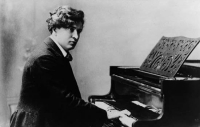
Ferruccio Busoni is an Italian composer, pianist, piano and composition teacher and conductor. Date of birth: April 1, 1866, Empoli, Italy Date and place of death: July 27, 1924, Berlin, Germany Education: University of Music and Performing Arts, Vienna Books: Entwurf einer neuen Ästhetik der Tonkunst,
David Baker
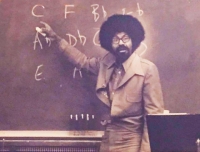
David Nathaniel Baker Jr. (December 21, 1931 – March 26, 2016) was an American jazz composer, conductor, and musician from Indianapolis, as well as a professor of jazz studies at the Indiana University Jacobs School of Music. Baker is best known as an educator and founder of the jazz studies program. From 1991 to 2012, he was conductor and musical and artistic director for the Smithsonian Jazz Masterworks Orchestra. He has more than 65 recordings, 70 books, and 400 articles to his credit.
Dark Cloud

Dark Cloud is an action role-playing video game developed by Level-5 and published by Sony Computer Entertainment for the PlayStation 2.
Jeno Hubay
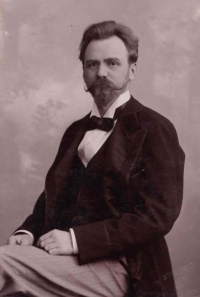
Jenő Hubay, Jenő Hubay von Szalatna, Hungarian: szalatnai Hubay Jenő (Hungarian pronunciation: ; 15 September 1858 – 12 March 1937), also known by his German name Eugen Huber (pronounced ), was a Hungarian violinist, composer and music teacher.
Stanley Myers
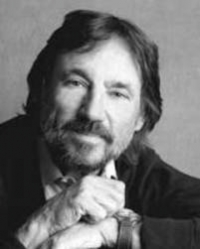
Stanley Myers (6 October 1930 – 9 November 1993), was a prolific British film composer who scored over sixty films. Born in Birmingham, as a teenager Myers went to King Edward's School in Edgbaston, a suburb of Birmingham. He is also known for composers music for cult films House of Whipcord, Frightmare and House of Mortal Sin for cult filmmaker Peter Walker.
He is best known for Cavatina (1970), an evocative guitar piece that served as the signature theme for Michael Cimino's 1978 film The Deer Hunter, and for which Myers won the Ivor Novello Award. A somewhat different version of this work, performed by John Williams, had appeared in The Walking Stick. And yet another version had lyrics added. Cleo Laine and Iris Williams, in separate recordings as He Was Beautiful, helped to make Cavatina become even more popular.
He is best known for Cavatina (1970), an evocative guitar piece that served as the signature theme for Michael Cimino's 1978 film The Deer Hunter, and for which Myers won the Ivor Novello Award. A somewhat different version of this work, performed by John Williams, had appeared in The Walking Stick. And yet another version had lyrics added. Cleo Laine and Iris Williams, in separate recordings as He Was Beautiful, helped to make Cavatina become even more popular.
Leonard Cohen
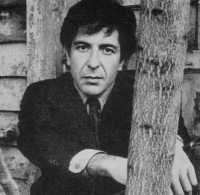
Leonard Norman Cohen, CC, GOQ (born September 21, 1934) is a Canadian singer-songwriter, musician, poet and novelist. Cohen published his first book of poetry in Montreal in 1956 and his first novel in 1963. His work often deals with the exploration of religion, isolation, sexuality and complex interpersonal relationships. Famously reclusive, spending years in a Zen Buddhist monastery, and possessing a persona frequently associated with mystique, he is extremely well-regarded by critics for his literary accomplishments and for producing an output of work of high artistic quality over a five-decade career.
Musically, Cohen's earliest songs (many of which appeared on the 1967 album, Songs of Leonard Cohen) were rooted in European folk music. In the 1970s, his material encompassed pop, cabaret and world music. Since the 1980s his high baritone voice has evolved into lower registers (bass baritone and bass), with accompaniment from a wide variety of instruments and female backing singers.
Over 2,000 renditions of Cohen's songs have been recorded. Cohen has been inducted into both the Canadian Music Hall of Fame and the Canadian Songwriters Hall of Fame and is also a Companion of the Order of Canada, the nation's highest civilian honour. While giving the speech at Cohen's induction into the American Rock and Roll Hall of Fame on March 10, 2008, Lou Reed described Cohen as belonging to the "highest and most influential echelon of songwriters".
Musically, Cohen's earliest songs (many of which appeared on the 1967 album, Songs of Leonard Cohen) were rooted in European folk music. In the 1970s, his material encompassed pop, cabaret and world music. Since the 1980s his high baritone voice has evolved into lower registers (bass baritone and bass), with accompaniment from a wide variety of instruments and female backing singers.
Over 2,000 renditions of Cohen's songs have been recorded. Cohen has been inducted into both the Canadian Music Hall of Fame and the Canadian Songwriters Hall of Fame and is also a Companion of the Order of Canada, the nation's highest civilian honour. While giving the speech at Cohen's induction into the American Rock and Roll Hall of Fame on March 10, 2008, Lou Reed described Cohen as belonging to the "highest and most influential echelon of songwriters".
Van Halen
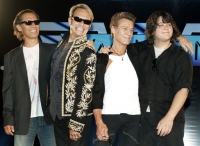
Van Halen is a hard rock band formed in Pasadena, California in 1972. They enjoyed success from the release of their self titled debut album in 1978. As of 2007 Van Halen has sold more than 80 million albums worldwide and have had the most number one hits on the Billboard Mainstream Rock chart. During the 1980's they also had more Billboard Hot 100 hits than any other hard rock, heavy metal band of the decade. According to the Recording Industry Association of America, Van Halen is the 19th best selling band/artist of all time with sales of over 56 million albums in the USA and is one of five rock bands that have had two albums sell more than 10 million copies in the USA.
In addition to being recognized for success, the band is known for the drama surrounding the exits of former members. The (multiple) exits of singers Sammy Hagar and David Lee Roth were surrounded in controversy and mass press coverage with various contrasting press statements between them and the band. More recently, founding bassist Michael Anthony was kicked out of the band for controversial reasons. Following their 2004 concert tour the band was on a hiatus from the public until September 2006, when new bassist Wolfgang Van Halen's place was confirmed and Roth-reunion rumours began to re-surface coinciding with the band's Rock and Roll Hall of Fame induction on March 12, 2007. After years of speculation, Van Halen began a tour with Roth in late 2007 across North America, which has been extended into 2008. An album is proposed to follow. Along with this, a live tour DVD was announced at their May 13, 2008 concert at the Izod Center that would contain recordings from several performances on their current tour.
Current members:
David Lee Roth – Lead vocals, acoustic guitar
Eddie Van Halen – Guitars, keyboards, bass, backing vocals
Wolfgang Van Halen – Bass, backing vocals
Alex Van Halen – Drums, percussion, backing vocals
In addition to being recognized for success, the band is known for the drama surrounding the exits of former members. The (multiple) exits of singers Sammy Hagar and David Lee Roth were surrounded in controversy and mass press coverage with various contrasting press statements between them and the band. More recently, founding bassist Michael Anthony was kicked out of the band for controversial reasons. Following their 2004 concert tour the band was on a hiatus from the public until September 2006, when new bassist Wolfgang Van Halen's place was confirmed and Roth-reunion rumours began to re-surface coinciding with the band's Rock and Roll Hall of Fame induction on March 12, 2007. After years of speculation, Van Halen began a tour with Roth in late 2007 across North America, which has been extended into 2008. An album is proposed to follow. Along with this, a live tour DVD was announced at their May 13, 2008 concert at the Izod Center that would contain recordings from several performances on their current tour.
Current members:
David Lee Roth – Lead vocals, acoustic guitar
Eddie Van Halen – Guitars, keyboards, bass, backing vocals
Wolfgang Van Halen – Bass, backing vocals
Alex Van Halen – Drums, percussion, backing vocals
William Finn
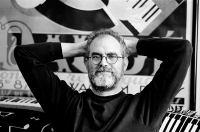
William Alan Finn (born February 28, 1952) is an American composer and lyricist of musicals. His musical Falsettos received the 1992 Tony Awards for Best Music and Lyrics and for Best Book.
Chopin

Frédéric Chopin (1 March 1810 – 17 October 1849) was a Polish composer and virtuoso pianist of the Romantic period. He is widely regarded as the greatest Polish composer, and ranks as one of music's greatest tone poets.
He was born in the village of Żelazowa Wola, in the Duchy of Warsaw, to a Polish mother and French-expatriate father, and in his early life was regarded as a child-prodigy pianist. In November 1830, at the age of 20, Chopin went abroad; following the suppression of the Polish November Uprising of 1830–31, he became one of many expatriates of the Polish "Great Emigration."
In Paris, he made a comfortable living as a composer and piano teacher, while giving few public performances. A Polish patriot,
Chopin's extant compositions were written primarily for the piano as a solo instrument. Though technically demanding, Chopin's style emphasizes nuance and expressive depth rather than virtuosity. Chopin invented musical forms such as the ballade and was responsible for major innovations in forms such as the piano sonata, waltz, nocturne, étude, impromptu and prelude. His works are mainstays of Romanticism in 19th-century classical music.
He was born in the village of Żelazowa Wola, in the Duchy of Warsaw, to a Polish mother and French-expatriate father, and in his early life was regarded as a child-prodigy pianist. In November 1830, at the age of 20, Chopin went abroad; following the suppression of the Polish November Uprising of 1830–31, he became one of many expatriates of the Polish "Great Emigration."
In Paris, he made a comfortable living as a composer and piano teacher, while giving few public performances. A Polish patriot,
Chopin's extant compositions were written primarily for the piano as a solo instrument. Though technically demanding, Chopin's style emphasizes nuance and expressive depth rather than virtuosity. Chopin invented musical forms such as the ballade and was responsible for major innovations in forms such as the piano sonata, waltz, nocturne, étude, impromptu and prelude. His works are mainstays of Romanticism in 19th-century classical music.
Stephen Sondheim

Stephen Joshua Sondheim (born March 22, 1930) is an American composer and lyricist for stage and film. He is the winner of an Academy Award, multiple Tony Awards (nine, more than any other composer) including the Special Tony Award for Lifetime Achievement in the Theatre (received 2008), multiple Grammy Awards, and a Pulitzer Prize. He has been described as "the greatest and perhaps best-known artist in the American musical theatre." His most famous scores include (as composer/lyricist) A Funny Thing Happened on the Way to the Forum, Company, Follies, A Little Night Music, Sweeney Todd, Sunday in the Park with George, Into the Woods, and Assassins, as well as the lyrics for West Side Story and Gypsy. He was president of the Dramatists Guild from 1973 to 1981.
Toshio Masuda
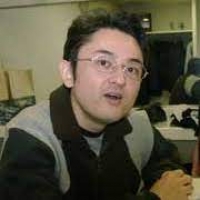
Toshio Masuda (増田 俊郎, Masuda Toshio, born October 28, 1959) is a Japanese composer. He has composed and synthesized scores for several Japanese television shows and animated series.Masuda is perhaps best known as the composer of the 2002 hit anime series Naruto where he combined traditional instruments like the shamisen and shakuhachi together with guitar, drums, bass, piano and other keyboard instruments along with chanting.
Yuki Kajiura

Yuki Kajiura (梶浦 由記 Kajiura Yuki?, born August 6, 1965 in Tokyo, Japan) is a Japanese composer and music producer. She has provided the music for several popular anime series, such as the final Kimagure Orange Road movie, Noir, .hack//Sign, Aquarian Age, Madlax, My-HiME, My-Otome, .hack//Roots, Pandora Hearts, Puella Magi Madoka Magica, Sword Art Online, Tsubasa Chronicle and the Kara no Kyoukai movies (amongst others). She also assisted Toshihiko Sahashi with Mobile Suit Gundam SEED and Mobile Suit Gundam SEED Destiny. Kajiura has also composed for video games, including the cutscene music for Xenosaga II and the entire Xenosaga III game soundtrack.
Paul McCartney
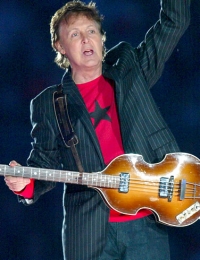
Sir James Paul McCartney, MBE (born 18 June 1942) is an English rock singer, bass guitarist, songwriter, composer, multi-instrumentalist, entrepreneur, record producer, film producer and animal-rights activist. He gained worldwide fame as a member of The Beatles, with John Lennon, George Harrison, and Ringo Starr. McCartney and Lennon formed one of the most influential and successful songwriting partnerships and "wrote some of the most popular music in rock and roll history". After leaving The Beatles, McCartney launched a successful solo career and formed the band Wings with his first wife, Linda Eastman McCartney, and singer-songwriter Denny Laine. He has worked on film scores, classical music, and ambient/electronic music; released a large catalogue of songs as a solo artist; and taken part in projects to help international charities.
McCartney is listed in Guinness World Records as the most successful musician and composer in popular music history, with 60 gold discs and sales of 100 million singles. His song "Yesterday" is listed as the most covered song in history - by over 3,700 artists so far - and has been played more than 7,000,000 times on American television and radio. Wings' 1977 single "Mull of Kintyre" became the first single to sell more than two million copies in the UK, and remains the UK's top selling non-charity single. (Three charity singles have since surpassed it in sales; the first to do so—in 1984—was Band Aid's "Do They Know It's Christmas?", whose participants included McCartney.)
His company MPL Communications owns the copyrights to more than 3,000 songs, including all of the songs written by Buddy Holly, along with the publishing rights to such musicals as Guys and Dolls, A Chorus Line, and Grease. McCartney is also an advocate for animal rights, vegetarianism, and music education; he is active in campaigns against landmines, seal hunting, and Third World debt.
McCartney is listed in Guinness World Records as the most successful musician and composer in popular music history, with 60 gold discs and sales of 100 million singles. His song "Yesterday" is listed as the most covered song in history - by over 3,700 artists so far - and has been played more than 7,000,000 times on American television and radio. Wings' 1977 single "Mull of Kintyre" became the first single to sell more than two million copies in the UK, and remains the UK's top selling non-charity single. (Three charity singles have since surpassed it in sales; the first to do so—in 1984—was Band Aid's "Do They Know It's Christmas?", whose participants included McCartney.)
His company MPL Communications owns the copyrights to more than 3,000 songs, including all of the songs written by Buddy Holly, along with the publishing rights to such musicals as Guys and Dolls, A Chorus Line, and Grease. McCartney is also an advocate for animal rights, vegetarianism, and music education; he is active in campaigns against landmines, seal hunting, and Third World debt.
Queen

Queen were an English rock band formed in 1970 in London by guitarist Brian May, lead vocalist Freddie Mercury, and drummer Roger Taylor, with bass guitarist John Deacon completing the lineup the following year. While it is uncertain how many albums the band has sold, estimations range from 130 million to over 300 million albums worldwide.
The band is noted for their musical diversity, multi-layered arrangements, vocal harmonies, and incorporation of audience participation into their live performances. Their 1985 Live Aid performance was voted the best live rock performance of all time in an industry poll.
Queen had moderate success in the early 1970s, with the albums Queen and Queen II, but it was with the release of Sheer Heart Attack in 1974 and A Night at the Opera the following year that the band gained international success. They have released fifteen studio albums, five live albums, and numerous compilation albums. Eighteen of these have reached number one on charts around the world.
Following Mercury's death in 1991 and Deacon's retirement later in the decade, May and Taylor have performed infrequently under the Queen name. Since 2005 they have been collaborating with Paul Rodgers, under the moniker Queen + Paul Rodgers.
The band is noted for their musical diversity, multi-layered arrangements, vocal harmonies, and incorporation of audience participation into their live performances. Their 1985 Live Aid performance was voted the best live rock performance of all time in an industry poll.
Queen had moderate success in the early 1970s, with the albums Queen and Queen II, but it was with the release of Sheer Heart Attack in 1974 and A Night at the Opera the following year that the band gained international success. They have released fifteen studio albums, five live albums, and numerous compilation albums. Eighteen of these have reached number one on charts around the world.
Following Mercury's death in 1991 and Deacon's retirement later in the decade, May and Taylor have performed infrequently under the Queen name. Since 2005 they have been collaborating with Paul Rodgers, under the moniker Queen + Paul Rodgers.
Antonio Carlos Jobim

Antonio Carlos Brasileiro de Almeida Jobim (January 25, 1927 in Rio de Janeiro – December 8, 1994 in New York City), also known as Tom Jobim, was a Grammy Award-winning Brazilian songwriter, composer, arranger, singer, and pianist/guitarist. A primary force behind the creation of the bossa nova style, Jobim is acknowledged as one of the most influential popular composers of the 20th century. His songs have been performed by many singers and instrumentalists within Brazil and internationally.
Sting
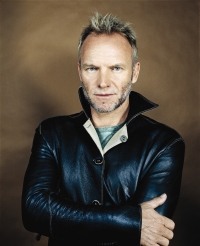
Gordon Matthew Thomas Sumner, CBE (born October 2, 1951), better known by his stage name Sting, is a three time Academy Award-nominated and multiple Grammy-winning English musician from Wallsend in North Tyneside. Prior to starting his solo career, he was the principal songwriter, lead singer and bassist of the rock band The Police. As a solo musician and member of The Police, Sting has sold over 100 million records, and received over sixteen Grammy Awards for his work, receiving his first Grammy for Best Rock Instrumental Performance in 1981, and receiving an Oscar nomination for best song.
Sting has stated that he gained his nickname while with the Phoenix Jazzmen. He once performed wearing a black and yellow sweater with hooped stripes that bandleader Gordon Solomon had noted made him look like a bumblebee; thus Sumner became "Sting". He uses Sting almost exclusively, except on official documents. In a press conference filmed in the movie Bring on the Night, he jokingly stated when referred to by a journalist as Gordon, "My children call me Sting, my mother calls me Sting, who is this Gordon character?"
Sting has stated that he gained his nickname while with the Phoenix Jazzmen. He once performed wearing a black and yellow sweater with hooped stripes that bandleader Gordon Solomon had noted made him look like a bumblebee; thus Sumner became "Sting". He uses Sting almost exclusively, except on official documents. In a press conference filmed in the movie Bring on the Night, he jokingly stated when referred to by a journalist as Gordon, "My children call me Sting, my mother calls me Sting, who is this Gordon character?"
ZUN

ZUN" and is the main programmer, scriptwriter, graphic artist, and music composer. His real name is Jun'ya Ōta
Mandy Moore
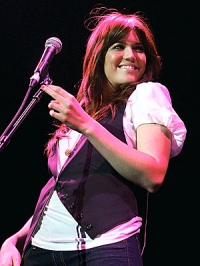
Amanda Leigh "Mandy" Moore (born April 10, 1984) is an American pop singer, songwriter, actress, and fashion designer. She grew up in Florida and came to fame as a teenager in the early 2000s, after the release of her teen-oriented pop albums So Real, I Wanna Be with You, and Mandy Moore. She has branched out into a film career, starring in 2002's A Walk to Remember and later appearing in the lead roles of other movies also aimed at teenage audiences. Two of her later films, American Dreamz and Saved!, were satires in which she portrayed darker characters than in her previous roles. Her private life, including her relationships with tennis player Andy Roddick as well as with actors Wilmer Valderrama and Zach Braff, has been much discussed in the media. Her fifth album, Wild Hope, was released in 2007.
Florence + The Machine
Florence and the Machine are an English indie rock band that formed in London in 2007, consisting of vocalist Florence Welch, keyboardist Isabella Summers, guitarist Rob Ackroyd, harpist Tom Monger, and a collaboration of other musicians.
Charice Pempengco

Charice Pempengco original name Jake Zyrus (formerly known under the mononym Charice; born May 10, 1992) is a Filipino singer and television personality. The single "Pyramid" from that album, featuring singer Iyaz, is Zyrus's most successful single to date, charting within the Top 40 in a number of countries after its debut live performance on The Oprah Winfrey Show. He released further albums Chapter 10 in 2013 and Catharsis in 2016.
Martin Smith

Martin James Smith is an English vocalist, guitarist, songwriter, and producer. Smith was the front man of the Christian rock and worship band Delirious?. When Delirious? disbanded in 2009, Smith became a solo artist.
Johann Pachelbel

Johann Pachelbel (pronounced /ˈpækəlbɛl/, /ˈpɑːkəlbɛl/, or /ˈpɑːkəbɛl/; baptized September 1, 1653 – buried March 9, 1706) was a German Baroque composer, organist and teacher, who brought the south German organ tradition to its peak. He composed a large body of sacred and secular music, and his contributions to the development of the chorale prelude and fugue have earned him a place among the most important composers of the middle Baroque era.
Pachelbel's work enjoyed enormous popularity during his lifetime; he had many pupils and his music became a model for the composers of south and central Germany. Today, Pachelbel is best known for the Canon in D, the only canon he wrote - although a true canon at the unison in three parts, it is often regarded more as a passacaglia, and it is in this mode that it has been arranged and transcribed for many different media. In addition to the canon, his most well-known works include the Chaconne in F minor, the Toccata in E minor for organ, and the Hexachordum Apollinis, a set of keyboard variations.
Pachelbel's music was influenced by southern German composers, such as Johann Jakob Froberger and Johann Kaspar Kerll, Italians such as Girolamo Frescobaldi and Alessandro Poglietti, French composers, and the composers of the Nuremberg tradition. Pachelbel preferred a lucid, uncomplicated contrapuntal style that emphasized melodic and harmonic clarity. His music is less virtuosic and less adventurous harmonically than that of Dieterich Buxtehude, although, like Buxtehude, Pachelbel experimented with different ensembles and instrumental combinations in his chamber music and, most importantly, his vocal music, much of which features exceptionally rich instrumentation. Pachelbel explored many variation forms and associated techniques, which manifest themselves in various diverse pieces, from sacred concertos to harpsichord suites.
Pachelbel's work enjoyed enormous popularity during his lifetime; he had many pupils and his music became a model for the composers of south and central Germany. Today, Pachelbel is best known for the Canon in D, the only canon he wrote - although a true canon at the unison in three parts, it is often regarded more as a passacaglia, and it is in this mode that it has been arranged and transcribed for many different media. In addition to the canon, his most well-known works include the Chaconne in F minor, the Toccata in E minor for organ, and the Hexachordum Apollinis, a set of keyboard variations.
Pachelbel's music was influenced by southern German composers, such as Johann Jakob Froberger and Johann Kaspar Kerll, Italians such as Girolamo Frescobaldi and Alessandro Poglietti, French composers, and the composers of the Nuremberg tradition. Pachelbel preferred a lucid, uncomplicated contrapuntal style that emphasized melodic and harmonic clarity. His music is less virtuosic and less adventurous harmonically than that of Dieterich Buxtehude, although, like Buxtehude, Pachelbel experimented with different ensembles and instrumental combinations in his chamber music and, most importantly, his vocal music, much of which features exceptionally rich instrumentation. Pachelbel explored many variation forms and associated techniques, which manifest themselves in various diverse pieces, from sacred concertos to harpsichord suites.
Cy Coleman
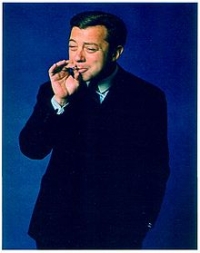
Cy Coleman (June 14, 1929 - November 18, 2004) was an American composer, songwriter, and jazz pianist.
Coleman's career as a Broadway composer began when he and Leigh collaborated on Wildcat (1960), which marked the Broadway debut of comedienne Lucille Ball. The score included the hit tune "Hey Look Me Over" (which was later adapted into one of LSU's school songs, "Hey, Fightin' Tigers"). When Ball became ill she left the show, and it closed. Next for the two was Little Me, with a book by Neil Simon based on the novel by Patrick Dennis (Auntie Mame). The show introduced Real Live Girl and I've Got Your Number, which became popular standards.
In 1964, Coleman met Dorothy Fields at a party, and when he asked if she would like to collaborate with him, she is reported to have answered, "Thank God somebody asked". Fields was revitalised by working with the much younger Coleman, and by the contemporary nature of their first project, which was Sweet Charity, again with a book by Simon, starring Gwen Verdon, and introducing the songs If My Friends Could See Me Now, I'm a Brass Band and Hey, Big Spender. The show was a major success and Coleman found working with Fields much easier than with Leigh. The partnership was to work on two more shows – an aborted project about Eleanor Roosevelt, and Seesaw which reached Broadway in 1973 after a troubled out-of-town tour. Despite mixed reviews, the show enjoyed a healthy run. The partnership was cut short by Fields' death in 1974.
Coleman remained prolific in the late 1970s. He collaborated on I Love My Wife (1977) with Michael Stewart, On The Twentieth Century (1978) with Betty Comden and Adolph Green, and Home Again, Home Again with Barbara Fried, although the latter never reached Broadway.
In 1980, Coleman served as producer and composer for the circus-themed Barnum, which co-starred Jim Dale and Glenn Close. Later in the decade, he collaborated on Welcome to the Club (1988) with A.E. Hotchner, and City of Angels (1989) with David Zippel. In the latter, inspired by the hard-boiled detective film noir of the 1930s and '40s, he returned to his jazz roots, and the show was a huge critical and commercial success.
Coleman's career as a Broadway composer began when he and Leigh collaborated on Wildcat (1960), which marked the Broadway debut of comedienne Lucille Ball. The score included the hit tune "Hey Look Me Over" (which was later adapted into one of LSU's school songs, "Hey, Fightin' Tigers"). When Ball became ill she left the show, and it closed. Next for the two was Little Me, with a book by Neil Simon based on the novel by Patrick Dennis (Auntie Mame). The show introduced Real Live Girl and I've Got Your Number, which became popular standards.
In 1964, Coleman met Dorothy Fields at a party, and when he asked if she would like to collaborate with him, she is reported to have answered, "Thank God somebody asked". Fields was revitalised by working with the much younger Coleman, and by the contemporary nature of their first project, which was Sweet Charity, again with a book by Simon, starring Gwen Verdon, and introducing the songs If My Friends Could See Me Now, I'm a Brass Band and Hey, Big Spender. The show was a major success and Coleman found working with Fields much easier than with Leigh. The partnership was to work on two more shows – an aborted project about Eleanor Roosevelt, and Seesaw which reached Broadway in 1973 after a troubled out-of-town tour. Despite mixed reviews, the show enjoyed a healthy run. The partnership was cut short by Fields' death in 1974.
Coleman remained prolific in the late 1970s. He collaborated on I Love My Wife (1977) with Michael Stewart, On The Twentieth Century (1978) with Betty Comden and Adolph Green, and Home Again, Home Again with Barbara Fried, although the latter never reached Broadway.
In 1980, Coleman served as producer and composer for the circus-themed Barnum, which co-starred Jim Dale and Glenn Close. Later in the decade, he collaborated on Welcome to the Club (1988) with A.E. Hotchner, and City of Angels (1989) with David Zippel. In the latter, inspired by the hard-boiled detective film noir of the 1930s and '40s, he returned to his jazz roots, and the show was a huge critical and commercial success.
Giulio Caccini
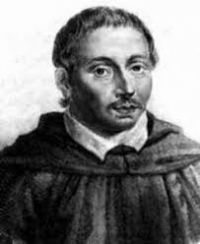
Giulio Romolo Caccini (also Giulio Romano) (Rome, 8 October 1551 – Florence, buried 10 December 1618) was an Italian composer, teacher, singer, instrumentalist and writer of the late Renaissance and early Baroque eras. He was one of the founders of the genre of opera, and one of the most influential creators of the new Baroque style. He was also the father of the composer Francesca Caccini and the singer Settimia Caccini.
Bach

Johann Sebastian Bach (31 March 1685 – 28 July 1750) was a German composer and organist whose sacred and secular works for choir, orchestra, and solo instruments drew together the strands of the Baroque period and brought it to its ultimate maturity. Although he introduced no new forms, he enriched the prevailing German style with a robust contrapuntal technique, an unrivalled control of harmonic and motivic organisation in composition for diverse musical forces, and the adaptation of rhythms and textures from abroad, particularly Italy and France.
Revered for their intellectual depth and technical and artistic beauty, Bach's works include the Brandenburg concertos; the Goldberg Variations; the English Suites, French Suites, Partitas, and Well-Tempered Clavier; the Mass in B Minor; the St. Matthew Passion; the St. John Passion; The Musical Offering; The Art of Fugue; the Sonatas and Partitas for violin solo; the Cello Suites; more than 200 surviving cantatas; and a similar number of organ works, including the celebrated Toccata and Fugue in D Minor.
While Bach's fame as an organist was great during his lifetime, he was not particularly well-known as a composer. His adherence to Baroque forms and contrapuntal style was considered "old-fashioned" by his contemporaries, especially late in his career when the musical fashion tended towards Rococo and later Classical styles. A revival of interest and performances of his music began early in the 19th century, and he is now widely considered to be one of the greatest composers in the Western tradition.
Revered for their intellectual depth and technical and artistic beauty, Bach's works include the Brandenburg concertos; the Goldberg Variations; the English Suites, French Suites, Partitas, and Well-Tempered Clavier; the Mass in B Minor; the St. Matthew Passion; the St. John Passion; The Musical Offering; The Art of Fugue; the Sonatas and Partitas for violin solo; the Cello Suites; more than 200 surviving cantatas; and a similar number of organ works, including the celebrated Toccata and Fugue in D Minor.
While Bach's fame as an organist was great during his lifetime, he was not particularly well-known as a composer. His adherence to Baroque forms and contrapuntal style was considered "old-fashioned" by his contemporaries, especially late in his career when the musical fashion tended towards Rococo and later Classical styles. A revival of interest and performances of his music began early in the 19th century, and he is now widely considered to be one of the greatest composers in the Western tradition.
J. Kowalewski
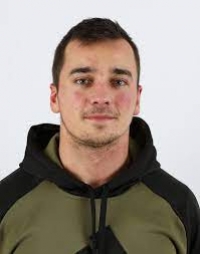
Most widely held works by Jakub Kowalewski. Chamber Music (Piano Trios) - BEETHOVEN, L. van( ) 2 editions published in 2014 in Undetermined and English and ...
Henry Martyn Hoisington
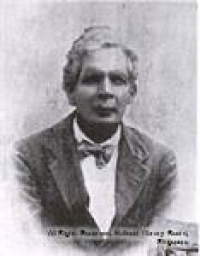
Henry Martyn (18 February 1781 – 16 October 1812) was an Anglican priest and missionary to the peoples of India and Persia. Born in Truro, Cornwall, ...
Title Of Show

is a one-act musical, with music and lyrics by Jeff Bowen and a book by Hunter Bell. The show chronicles its own creation as an entry in the New York Musical Theatre Festival, and follows the struggles of the author and composer/lyricist and their two actress friends during the initial brief (three-week) creative period, along with subsequent events leading up to the show's production.
Avril Lavigne

Avril Lavigne Whibley (born September 27, 1984), better known by her birth name of Avril Lavigne, is a Canadian Grammy award-nominated rock singer, musician, fashion designer and actress. In 2006, Canadian Business Magazine ranked her the seventh most powerful Canadian in Hollywood.
Lavigne's debut album, Let Go, was released in 2002. Over 16 million copies were sold worldwide and it was certified six times platinum in the United States. Her second and third albums, Under My Skin (2004) sold over 8 million copies and The Best Damn Thing (2007) currently over 6 million copies sold respectively, reached number one on the U.S. Billboard 200. Lavigne has scored six number one songs worldwide to date and a total of eleven top ten hits, including "Complicated", "Sk8er Boi", "I'm With You", "My Happy Ending", and "Girlfriend" which became #1 hits in the ARC Top 40. In December 2007, Lavigne was ranked at #7 in the Forbes "Top 20 Earners Under 25", with an annual earnings of $12 million. Currently, Avril Lavigne has sold about 30 million albums worldwide.
Lavigne's debut album, Let Go, was released in 2002. Over 16 million copies were sold worldwide and it was certified six times platinum in the United States. Her second and third albums, Under My Skin (2004) sold over 8 million copies and The Best Damn Thing (2007) currently over 6 million copies sold respectively, reached number one on the U.S. Billboard 200. Lavigne has scored six number one songs worldwide to date and a total of eleven top ten hits, including "Complicated", "Sk8er Boi", "I'm With You", "My Happy Ending", and "Girlfriend" which became #1 hits in the ARC Top 40. In December 2007, Lavigne was ranked at #7 in the Forbes "Top 20 Earners Under 25", with an annual earnings of $12 million. Currently, Avril Lavigne has sold about 30 million albums worldwide.
Glee

Glee is a musical comedy-drama television series that airs on Fox in the United States. It focuses on the high school glee club New Directions competing on the show choir competition circuit, while its members deal with relationships, sexuality and social issues. The initial main cast encompassed club director and Spanish teacher Will Schuester (Matthew Morrison), cheerleading coach Sue Sylvester (Jane Lynch), guidance counselor Emma Pillsbury (Jayma Mays), Will's wife Terri (Jessalyn Gilsig), and eight club members played by Dianna Agron, Chris Colfer, Kevin McHale, Lea Michele, Cory Monteith, Amber Riley, Mark Salling and Jenna Ushkowitz. For the second season, formerly recurring cast members Mike O'Malley, Heather Morris and Naya Rivera were promoted to the main cast.
The series was created by Ryan Murphy, Brad Falchuk and Ian Brennan, who first conceived Glee as a film. The pilot episode was broadcast on May 19, 2009, and the first season aired from September 9, 2009 to June 8, 2010. The second season began airing on September 21, 2010, and a third season has been commissioned. Glee features on-screen performance-based musical numbers that are selected by Murphy, who aims to maintain a balance between show tunes and chart hits. Songs covered in the show are released through the iTunes Store during the week of broadcast, and a series of Glee albums have been released by Columbia Records. The music of Glee has been a commercial success, with over thirteen million digital single sales and five million album sales. The series' merchandise also includes DVD and Blu-Ray releases, a young adult book series, an iPad application, and a karaoke game for the Wii.
During its first season, Glee received generally favorable reviews from critics, with Metacritic's weighted average based on the impression of 18 critical reviews of 77 percent. The season was nominated for nineteen Emmy Awards, four Golden Globe Awards, six Satellite Awards and fifty-seven other awards, with wins including the 2010 Golden Globe Award for Best Television Series—Musical or Comedy, and Emmy awards for Lynch, guest-star Neil Patrick Harris and Murphy's direction of the pilot episode. The second season has currently been nominated for five Golden Globes including Best Television Series in a Comedy and as well as nominations for Matthew Morrison, Jane Lynch, Lea Michele and Chris Colfer.
The series was created by Ryan Murphy, Brad Falchuk and Ian Brennan, who first conceived Glee as a film. The pilot episode was broadcast on May 19, 2009, and the first season aired from September 9, 2009 to June 8, 2010. The second season began airing on September 21, 2010, and a third season has been commissioned. Glee features on-screen performance-based musical numbers that are selected by Murphy, who aims to maintain a balance between show tunes and chart hits. Songs covered in the show are released through the iTunes Store during the week of broadcast, and a series of Glee albums have been released by Columbia Records. The music of Glee has been a commercial success, with over thirteen million digital single sales and five million album sales. The series' merchandise also includes DVD and Blu-Ray releases, a young adult book series, an iPad application, and a karaoke game for the Wii.
During its first season, Glee received generally favorable reviews from critics, with Metacritic's weighted average based on the impression of 18 critical reviews of 77 percent. The season was nominated for nineteen Emmy Awards, four Golden Globe Awards, six Satellite Awards and fifty-seven other awards, with wins including the 2010 Golden Globe Award for Best Television Series—Musical or Comedy, and Emmy awards for Lynch, guest-star Neil Patrick Harris and Murphy's direction of the pilot episode. The second season has currently been nominated for five Golden Globes including Best Television Series in a Comedy and as well as nominations for Matthew Morrison, Jane Lynch, Lea Michele and Chris Colfer.
Mozart

Wolfgang Amadeus Mozart, full name Johann Chrysostom Wolfgang Amadeus Mozart (27 January 1756 â 5 December 1791) was a prolific and influential composer of the Classical era. His over 600 compositions include works widely acknowledged as pinnacles of symphonic, concertante, chamber, piano, operatic, and choral music. Mozart is among the most enduringly popular of classical composers, and many of his works are part of the standard concert repertoire.
Mozart's music, like Haydn's, stands as an archetypal example of the Classical style. His works spanned the period during which that style transformed from one exemplified by the style galant to one that began to incorporate some of the contrapuntal complexities of the late Baroque, complexities against which the galant style had been a reaction. Mozart's own stylistic development closely paralleled the development of the classical style as a whole. In addition, he was a versatile composer and wrote in almost every major genre, including symphony, opera, the solo concerto, chamber music including string quartet and string quintet, and the piano sonata. While none of these genres were new, the piano concerto was almost single-handedly developed and popularized by Mozart. He also wrote a great deal of religious music, including masses; and he composed many dances, divertimenti, serenades, and other forms of light entertainment.
The central traits of the classical style can be identified in Mozart's music. Clarity, balance, and transparency are hallmarks of his work.
Mozart's music, like Haydn's, stands as an archetypal example of the Classical style. His works spanned the period during which that style transformed from one exemplified by the style galant to one that began to incorporate some of the contrapuntal complexities of the late Baroque, complexities against which the galant style had been a reaction. Mozart's own stylistic development closely paralleled the development of the classical style as a whole. In addition, he was a versatile composer and wrote in almost every major genre, including symphony, opera, the solo concerto, chamber music including string quartet and string quintet, and the piano sonata. While none of these genres were new, the piano concerto was almost single-handedly developed and popularized by Mozart. He also wrote a great deal of religious music, including masses; and he composed many dances, divertimenti, serenades, and other forms of light entertainment.
The central traits of the classical style can be identified in Mozart's music. Clarity, balance, and transparency are hallmarks of his work.
Sheila Jordan
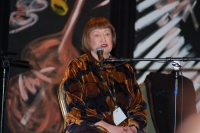
Sheila Jordan (born Sheila Jeanette Dawson; November 18, 1928) is an American jazz singer and songwriter. She has recorded as a session musician with an array of critically acclaimed artists in addition to recording her own albums. Jordan pioneered a bebop and scat jazz singing style with an upright bass as the only accompaniment. Jordan's music has earned praise from many critics, particularly for her ability to improvise lyrics; Scott Yanow describes her as "one of the most consistently creative of all jazz singers." Charlie Parker often introduced Jordan as "the singer with the million dollar ears."
Samuel Cohen
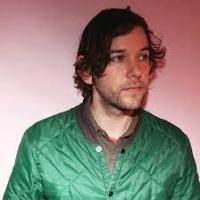
Samuel Benjamin Cohen (born September 28, 1979) is an American rock vocalist, songwriter, multi-instrumentalist, artist, and producer based in Brooklyn, New York. A founding member of the psychedelic rock and pop band Apollo Sunshine, he released several albums with the group in the early 2000s. In 2009 he formed the solo project Yellowbirds, releasing the debut album The Color in 2011. This release was followed by Songs from the Vanished Frontier in 2013
Miho Fukuhara

Miho Fukuhara is a Japanese pop singer who made an independent label debut in 2006, releasing a single titled "The Roots" and mini-album titled Step Out. In early 2008, she made her major-label debut under Sony Music Entertainment Japan.
Andrei Baicoianu
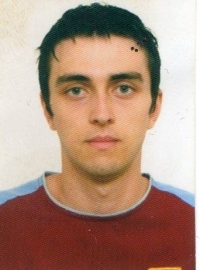
Andrei Baicoianu Arrangeur, Compositeur, Interprete, Editeur Roumanie, PloiestiImprovisation is a musical idea created without premeditation, while rehearsal is vigorous repetition of an idea until it has achieved cohesion. I sometimes add improvisation to a well-rehearsed idea to create a
unique performance.
unique performance.
Christina Perri

Christina Perri (born August 19, 1986) is an American singer and songwriter from Philadelphia. Her song "Jar of Hearts" charted in the United States after it was featured on the Fox television show So You Think You Can Dance in 2010. Rolling Stone named her the "Band of the Week" on October 26, 2010. On May 10, 2011, Perri's "Jar of Hearts" was featured on Glee (Season 2, Episode 20 "Prom Queen").
Ernesto Nazareth
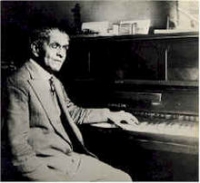
Ernesto Júlio de Nazareth (March 20, 1863 – February 1, 1934) was a Brazilian composer and pianist, especially noted for his creative Maxixe and Choro compositions. Influenced by African rhythms and many musical styles like the Lundu and the Choro, he never fully accepted this influence, refusing to give popular names to his compositions. A musician of classical training, he classified his music as "Brazilian tangos", since the Argentine tango and dances were considered fashionable at the time. His piano repertoire is now part of the teaching programs of both classical and popular styles, as Nazareth once served at the boundary between these two worlds.
Brahms

Johannes Brahms (May 7, 1833 â April 3, 1897) was a German composer of the Romantic period. He was born in Hamburg and in his later years he settled in Vienna, Austria.
Brahms maintained a Classical sense of form and order in his works â in contrast to the opulence of the music of many of his contemporaries. Thus many admirers (though not necessarily Brahms himself) saw him as the champion of traditional forms and "pure music," as opposed to the New German embrace of program music.
Brahms venerated Beethoven: in the composer's home, a marble bust of Beethoven looked down on the spot where he composed, and some passages in his works are reminiscent of Beethoven's style. The main theme of the finale of Brahms's First Symphony is reminiscent of the main theme of the finale of Beethoven's Ninth, and when this resemblance was pointed out to Brahms he replied that any ass â jeder Esel â could see that.
Ein deutsches Requiem was partially inspired by his mother's death in 1865, but also incorporates material from a Symphony he started in 1854, but abandoned following Schumann's suicide attempt. He once wrote that the Requiem "belonged to Schumann". The first movement of this abandoned Symphony was re-worked as the first movement of the First Piano Concerto.
Brahms also loved the Classical composers Mozart and Haydn. He collected first editions and autographs of their works, and edited performing editions. He also studied the music of pre-classical composers, including Giovanni Gabrieli, Johann Adolph Hasse, Heinrich Schütz and especially Johann Sebastian Bach. His friends included leading musicologists, and with Friedrich Chrysander he edited an edition of the works of François Couperin. He looked to older music for inspiration in the arts of strict counterpoint; the themes of some of his works are modelled on Baroque sources, such as Bach's The Art of Fugue in the fugal finale of Cello Sonata No. 1, or the same composer's Cantata No. 150 in the passacaglia theme of the Fourth Symphony's finale.
Brahms maintained a Classical sense of form and order in his works â in contrast to the opulence of the music of many of his contemporaries. Thus many admirers (though not necessarily Brahms himself) saw him as the champion of traditional forms and "pure music," as opposed to the New German embrace of program music.
Brahms venerated Beethoven: in the composer's home, a marble bust of Beethoven looked down on the spot where he composed, and some passages in his works are reminiscent of Beethoven's style. The main theme of the finale of Brahms's First Symphony is reminiscent of the main theme of the finale of Beethoven's Ninth, and when this resemblance was pointed out to Brahms he replied that any ass â jeder Esel â could see that.
Ein deutsches Requiem was partially inspired by his mother's death in 1865, but also incorporates material from a Symphony he started in 1854, but abandoned following Schumann's suicide attempt. He once wrote that the Requiem "belonged to Schumann". The first movement of this abandoned Symphony was re-worked as the first movement of the First Piano Concerto.
Brahms also loved the Classical composers Mozart and Haydn. He collected first editions and autographs of their works, and edited performing editions. He also studied the music of pre-classical composers, including Giovanni Gabrieli, Johann Adolph Hasse, Heinrich Schütz and especially Johann Sebastian Bach. His friends included leading musicologists, and with Friedrich Chrysander he edited an edition of the works of François Couperin. He looked to older music for inspiration in the arts of strict counterpoint; the themes of some of his works are modelled on Baroque sources, such as Bach's The Art of Fugue in the fugal finale of Cello Sonata No. 1, or the same composer's Cantata No. 150 in the passacaglia theme of the Fourth Symphony's finale.
Ingrid Michaelson

Ingrid Michaelson (born 1979) is a New York-based indie-pop singer-songwriter, probably best known for her single The Way I Am. Her music has been featured in episodes of several popular television shows, including Grey's Anatomy and One Tree Hill, as well as in Old Navy's Fall 2007 Fair Isle advertising campaign.
She is a graduate of Staten Island Technical High School and Binghamton University, where she received a degree in theater. Her time at Binghamton is both mentioned and the backdrop for the song, "The Hat." She grew up doing a musical theater group called "Kids On Stage". Later in life she became director until she decided to pursue her career in music. On September 10, 2008, she opened for Dave Matthews Band's Stand Up for a Cure charity show at Madison Square Garden. Her set included Die Alone, Breakable, Overboard, Be OK, The Way I Am, Locked Up and some playful covers of Ice Ice Baby and The Fresh Prince of Bel-Air Theme song. She closed her set with a solo acoustic performance of Over the Rainbow in tribute to the late DMB saxophonist LeRoi Moore.
She is a graduate of Staten Island Technical High School and Binghamton University, where she received a degree in theater. Her time at Binghamton is both mentioned and the backdrop for the song, "The Hat." She grew up doing a musical theater group called "Kids On Stage". Later in life she became director until she decided to pursue her career in music. On September 10, 2008, she opened for Dave Matthews Band's Stand Up for a Cure charity show at Madison Square Garden. Her set included Die Alone, Breakable, Overboard, Be OK, The Way I Am, Locked Up and some playful covers of Ice Ice Baby and The Fresh Prince of Bel-Air Theme song. She closed her set with a solo acoustic performance of Over the Rainbow in tribute to the late DMB saxophonist LeRoi Moore.
Norah Jones
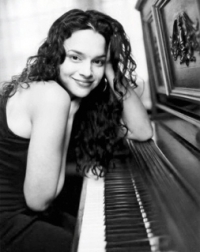
Norah Jones (born Geethali Norah Jones Shankar on March 30, 1979) is an American singer-songwriter, pianist, keyboardist, guitarist, and occasional actress of Anglo-American and Bengali descent. She is the daughter of famed sitar virtuoso Ravi Shankar and half-sister of sitarist Anoushka Shankar.
Jones' career was launched with her 2002 debut album Come Away with Me, an adult contemporary pop/vocal jazz album with a sensual, plaintive soul/folk/country tinge, that sold over twenty million copies worldwide and received five Grammy Awards, with Jones winning "Best New Artist". Her second album, Feels like Home, was released in 2004, clocking more than a million sales in the first week of U.S. release. In 2007, she released her third album, Not Too Late, which debuted at number one on the world charts. She has become one of the most successful recording artists of the decade, racking up sales of more than 16 million records in the US and 39 million records worldwide.
Jones' career was launched with her 2002 debut album Come Away with Me, an adult contemporary pop/vocal jazz album with a sensual, plaintive soul/folk/country tinge, that sold over twenty million copies worldwide and received five Grammy Awards, with Jones winning "Best New Artist". Her second album, Feels like Home, was released in 2004, clocking more than a million sales in the first week of U.S. release. In 2007, she released her third album, Not Too Late, which debuted at number one on the world charts. She has become one of the most successful recording artists of the decade, racking up sales of more than 16 million records in the US and 39 million records worldwide.
No Doubt
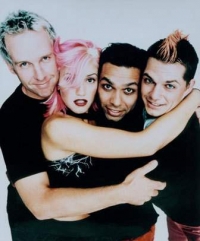
No Doubt is a rock band from Anaheim, California, United States, founded in 1986. The ska-rock sound of its first album failed to make waves due to the popularity of the grunge movement at the time. The band's diamond-certified album Tragic Kingdom helped to launch the ska revival of the 1990s, and "Don't Speak", the third single from the album, set a record when it spent sixteen weeks at the number one spot on the Billboard Hot 100 Airplay chart, later broken by the Goo Goo Dolls' "Iris".
The group released its next album, Return of Saturn, four years later, but despite positive reviews, the album was considered a commercial failure. Fifteen months later, the band reappeared with Rock Steady, which incorporated reggae and dancehall music into their work. The album was primarily recorded in Jamaica and featured collaborations with Jamaican artists Bounty Killer, Sly and Robbie, and Lady Saw. The album produced two Grammy-winning singles, "Hey Baby" and "Underneath It All".
No Doubt released the compilation The Singles 1992-2003 and box set Boom Box in 2003, both of which contained a cover version of the Talk Talk synthpop song "It's My Life". Frontwoman Gwen Stefani launched her solo career the next year with several collaborations, including bandmate Tony Kanal and Neptune Pharrell, while guitarist Tom Dumont began his side project, Invincible Overlord. During its career, the band has won two Grammy Awards and sold 27 million records worldwide to date.
The group released its next album, Return of Saturn, four years later, but despite positive reviews, the album was considered a commercial failure. Fifteen months later, the band reappeared with Rock Steady, which incorporated reggae and dancehall music into their work. The album was primarily recorded in Jamaica and featured collaborations with Jamaican artists Bounty Killer, Sly and Robbie, and Lady Saw. The album produced two Grammy-winning singles, "Hey Baby" and "Underneath It All".
No Doubt released the compilation The Singles 1992-2003 and box set Boom Box in 2003, both of which contained a cover version of the Talk Talk synthpop song "It's My Life". Frontwoman Gwen Stefani launched her solo career the next year with several collaborations, including bandmate Tony Kanal and Neptune Pharrell, while guitarist Tom Dumont began his side project, Invincible Overlord. During its career, the band has won two Grammy Awards and sold 27 million records worldwide to date.
Utada Hikaru

Hikaru Utada (born January 19, 1983), also known by her fans as Hikki, is a singer-songwriter, arranger and record producer in Japan. She is well-known internationally for her two theme song contributions to Square Enix's Kingdom Hearts video game series:"Simple and Clean" and "Sanctuary".
Utada's debut album First Love became the Japan's biggest selling album of all time with over 7.65 million copies sold in Japan alone to date. The release of her later works only help her reign as one of Japan's top artist, with 3 of her Japanese studio albums being ranked in Top 10 best-selling albums ever in Japan (#1, #4, #8). She has had 12 #1 hits to date on the Oricon Singles chart, with two notable record achievements for a female solo or group artist: 5 of them being million-sellers and 4 placing in the Top 100 All-Time Best-selling Singles.
In addition, Utada has won the Nihon Golden Disk "Song of the Year" award for 14 of her singles since 2000 and has won the Golden Disc "Pop/Rock Album of the Year" award for all her 4 Japanese studio albums. In 2003, Utada was ranked the #24 Japanese pop artist in its survey of "Top 100 Japanese Pop Artists of All Time" by HMV, and #10 in HMV's "Top 30 Best Japanese Singers of All Time" in 2006.
In 2007, her single "Flavor of Life" reached #2 in worldwide digital download yearly single chart with over 7.2 million downloads, and she sold a total of 12 million digital ringtones and songs in that same year, making her the first artist ever to have that many digital sales in a year's time.
Utada's debut album First Love became the Japan's biggest selling album of all time with over 7.65 million copies sold in Japan alone to date. The release of her later works only help her reign as one of Japan's top artist, with 3 of her Japanese studio albums being ranked in Top 10 best-selling albums ever in Japan (#1, #4, #8). She has had 12 #1 hits to date on the Oricon Singles chart, with two notable record achievements for a female solo or group artist: 5 of them being million-sellers and 4 placing in the Top 100 All-Time Best-selling Singles.
In addition, Utada has won the Nihon Golden Disk "Song of the Year" award for 14 of her singles since 2000 and has won the Golden Disc "Pop/Rock Album of the Year" award for all her 4 Japanese studio albums. In 2003, Utada was ranked the #24 Japanese pop artist in its survey of "Top 100 Japanese Pop Artists of All Time" by HMV, and #10 in HMV's "Top 30 Best Japanese Singers of All Time" in 2006.
In 2007, her single "Flavor of Life" reached #2 in worldwide digital download yearly single chart with over 7.2 million downloads, and she sold a total of 12 million digital ringtones and songs in that same year, making her the first artist ever to have that many digital sales in a year's time.
Johann Nepomuk Hummel
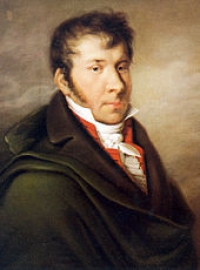
Johann Nepomuk Hummel (14 November 1778 – 17 October 1837) was an Austrian composer and virtuoso pianist. His music reflects the transition from the classical to the romantic musical era.Hummel was born as an only child (which was unusual for that period) in Pressburg, Kingdom of Hungary (now Bratislava, Slovakia). He was named after the Czech patron saint John of Nepomuk. His father, Johannes Hummel, was the director of the Imperial School of Military Music in Vienna; his mother, Margarethe Sommer Hummel, was the widow of the wigmaker Josef Ludwig. The couple married just four months beforehand.
Niels Dolieslager
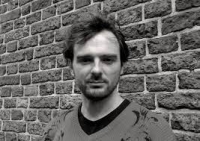
Niels Dolieslager (1977) is a composer of contemporary music, music for media and pop music and works as a piano and composition teacher, ...
 Daily Sheet Music is a web site for those who wants to access popular sheet music easily,
letting them download the sheet music for free for trial purposes.
It's completely free to download and try the listed sheet music, but you have to delete the files after 24 hours of trial period.
Don't forget, if you like the piece of music you have just learned playing,
treat the artist with respect, and go buy the original sheet music.
Daily Sheet Music is a web site for those who wants to access popular sheet music easily,
letting them download the sheet music for free for trial purposes.
It's completely free to download and try the listed sheet music, but you have to delete the files after 24 hours of trial period.
Don't forget, if you like the piece of music you have just learned playing,
treat the artist with respect, and go buy the original sheet music.